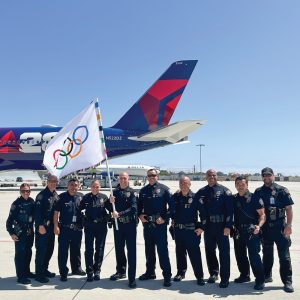 LAAPOA was pleased to share last month that the House Appropriations Subcommittee included Congresswoman Maxine Waters’ requested $963,000 in federal funding to improve LAXPD’s vehicle fleet and equipment in its markup of the fiscal year 2026 bill for the Commerce, Justice, Science, and Related Agencies Subcommittee. When Waters announced the funding request last year, she noted that the goal was to enhance the ability of the Department to protect the safety and security of the physical structures, passengers, commerce and thousands of people who work and pass through LAX daily.
LAAPOA was pleased to share last month that the House Appropriations Subcommittee included Congresswoman Maxine Waters’ requested $963,000 in federal funding to improve LAXPD’s vehicle fleet and equipment in its markup of the fiscal year 2026 bill for the Commerce, Justice, Science, and Related Agencies Subcommittee. When Waters announced the funding request last year, she noted that the goal was to enhance the ability of the Department to protect the safety and security of the physical structures, passengers, commerce and thousands of people who work and pass through LAX daily.
This was welcome news, as LAAPOA has long called on Los Angeles World Airports (LAWA) and the City of L.A. to invest in the equipment and resources LAXPD officers need to do their jobs effectively. But our attempts have repeatedly fallen on deaf ears. For example, among our advocacy for safer working conditions, we’ve highlighted the Department’s aging patrol fleet, which is in various states of disrepair and poses health and safety risks to personnel. Many vehicles have exceeded 100,000 miles — some well over 250,000 — and have issues such as nonfunctioning seatbelts, broken seats and other signs of significant wear and tear. We have previously detailed the consequences of using such vehicles, citing one incident in which a member suffered severe injuries from an airbag cover during a traffic accident in a vehicle over 10 years old with nearly 150,000 miles. We’ve also pointed out that most vehicles are in near-constant use due to insufficient fleet size, preventing proper vehicle rotation. This excessive use shortens vehicle lifespans and increases the need for maintenance.
Congresswoman Waters’ funding request underscores an irrefutable fact: The LAXPD must be properly funded, trained and equipped to keep pace with the ongoing expansion and modernization of LAX, currently ranked the seventh busiest passenger airport in the world. With the fast-approaching FIFA World Cup in 2026 and Olympics in 2028 — two major global events that will place L.A. in the international spotlight — millions of travelers will pass through the airport, putting our ability to ensure public safety to the test. This reality is being recognized at both the federal and local levels.
On July 4, President Donald Trump signed the One Big Beautiful Bill (OBBB) Act into law. The sweeping tax and spending package includes $1 billion for Olympics security and planning, as well as $625 million for the World Cup. While the specifics of how funding will be allocated are still to be determined, distribution will be handled by the Federal Emergency Management Agency (FEMA) through the Homeland Security Grant Program, which targets anti-terrorism and other threats.
In addition, the president signed an executive order on August 5 establishing a new task force, led by himself and Vice President JD Vance, to help oversee the Olympics and coordinate with federal, state and local partners on security and transportation. Trump stated he would mobilize “the entire federal government to ensure the games are safe, seamless and historically successful.”
On the local level, L.A. city leaders in early August began negotiations with LA28, the private committee overseeing the Olympics and Paralympics, to discuss the use of city police, traffic officers and other employees for the Games — a move that could potentially cost hundreds of millions of taxpayer dollars. According to the L.A. Times, security spending ranks among the city’s largest expenses. The LAPD will be expected to coordinate with local, state and federal agencies to keep events safe. With ongoing staffing challenges faced by the LAPD, this could lead to significant overtime costs, as seen when the L.A. City Council approved a $5 million loan from the city’s reserve fund to help cover overtime during anti-ICE protests in June, when costs climbed to $11.7 million.
With billions being allocated for public safety initiatives and resources for the Olympics and World Cup, LAAPOA is aiming to build on that momentum by renewing our calls for airport management and the City to make similar investments in the airport police force — not just in preparation for high-profile events, but consistently, year-round.
“The men and women of the LAXPD are on the front lines of stopping domestic and international threat actors from entering the city each and every day, whether we’re hosting global events or not,” LAAPOA President Marshall McClain says. “They deserve the latest equipment and vehicles to meet the demands of this challenging job. Beyond that, investments must support recruitment and retention to help grow the force, high-quality training to ensure officers stay current with the latest airport policing functions and aviation-specific protocols, and more. We must seize this moment, harnessing the energy and enthusiasm of our local and federal officials to support public safety in L.A. and help the LAXPD become the best it can be.”
